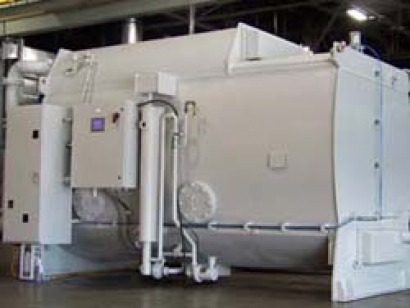
For 50 years, Power Partners' facility in Athens, GA, has been a leading manufacturer of overhead distribution transformers for the electric power industry. More recently, however, it has started producing energy-efficient, environmentally friendly adsorption chillers and solar water heating systems.
Power Partners explains that its Eco-Max adsorption chillers are more reliable than absorption chiller because they use water as opposed to lithium bromide. “There are no crystallization problems, no corrosion, no chemical testing and no hazardous leaks,” says the company. “Water is adsorbed onto a bed of silica gel and regenerated under low pressure to produce chilled water”. Eco-max adsorption chillers also need no compressors, no high pressure refrigerants and no oil changes, and they create virtually no noise or vibration.
“Ultra-low electricity usage means low operating costs and exceptionally low carbon emissions,” adds the company, which saw a commercial opportunity to develop tri-generation packages, as its adsorption chillers can be driven by the waste heat from factory processes, CHP or solar thermal collectors. It describes the new tri-generation packages, which are also known as combined cooling, heating and power (CCHP) packages, as “a natural extension of the company’s product portfolio”.
“With increasing electricity rates – as well as pressure to cut expenses, increase air quality and reduce emissions – commercial, industrial and utility companies and other types of organizations are seeking ways to use energy more efficiently,” said Mike Stonecipher, ECO-MAX Chillers Business Segment Leader for Power Partners.
“Tri-generation is becoming a preferred method to produce a company’s or facility’s power and energy requirements. Our new tri-generation packages will enable savings in capital and energy costs,” he added.
Initially, Power Partners’ tri-generation packages (containing CHP equipment, an Eco-max adsorption chiller, cooling tower, pumps, piping, sensors for generator and chiller, etc.) will be available in generating capacities from 200 kW to 2MW. The power can be generated by micro turbines, reciprocating engines or fuel cells.
In the US, Power Partners is a partner in the Environmental Protection Agency's Combined Heat and Power Partnership and a partner in the Green Supplier Network.
For additional information:

